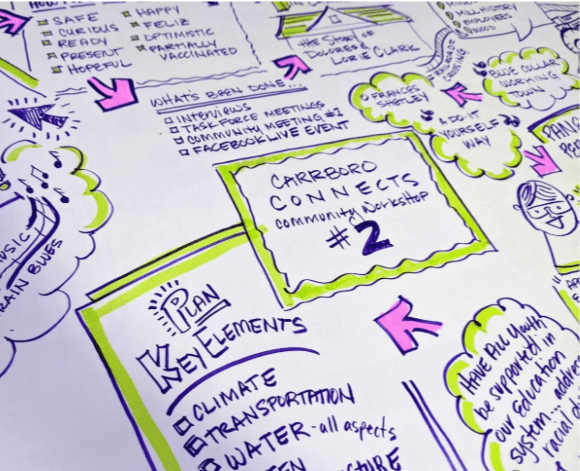Election seasons in Chapel Hill and Carrboro are short, if not always sweet. In a span of just four months, candidates file for office, assemble a campaign team, answer questionnaires, meet voters, put up yard signs, talk to voters at polling sites, and await election results.
If you’re new here, or just haven’t paid attention to local politics, you might think that there’s not much difference between the candidates. While our local elections are non-partisan, most candidates are currently-registered Democrats, and most agree on all the big issues that divide the country at a national and state level—abortion rights, gun safety, civil rights.
But local governments have limited power over these issues. At best, our town councils and school board can pass a resolution signaling their unhappiness over a decision made by the U.S. Congress or the Supreme Court, but they can’t disobey or change laws. Even in the areas where local governments are supposed to have a lot of power—deciding what can be built in town, installing sidewalks and bike lanes—municipalities in North Carolina are constrained. Almost everything the town would like to do requires state approval, and, in many cases, substantial funding from the state and federal government.
All of this means that changing the status quo in Chapel Hill and Carrboro is hard. Something as simple as building a bike path requires working with a half-dozen government agencies to secure permissions and funding. Progress requires planning.
While all of the candidates running in Chapel Hill and Carrboro claim to be in support of greenways, transit, parks, and affordable housing, they differ on a fundamental question. Are the plans the towns of Chapel Hill and Carrboro have made, and are currently in the process of carrying out, going in the right direction? Or should we throw them out and start over, even if it means further delay and, in the interim, that we stick with the status quo?
In this series of articles, we will focus on the policy questions that will be addressed by the Chapel Hill and Carrboro Town Councils in the next two years. As we always do at Triangle Blog Blog, we will offer our opinions, but we’ll also point you to primary source documents so you can make your own judgment. Here are a few big questions we’ll discuss:
- Should Carrboro carry out the objectives described in its 2022-2042 Comprehensive Plan, which the council unanimously adopted last year?
- Should Chapel Hill commit to building a Complete Community, as its town council resolved to do in December 2022?
- Will Chapel HIll and Carrboro carry out their greenway plans?
- If awarded funding to build a North-South Bus Rapid Transit line, will Chapel Hill support transit oriented development along Martin Luther King, Jr. Boulevard?
- Will Chapel Hill rewrite its zoning to allow for more housing diversity and density?
These are the critical questions of this year’s campaign, and candidates have substantive disagreements about the best path forward for our community. In the coming weeks, we will discuss these issues in more detail, and possibly others. In the past, too many local political campaigns have effectively served as referendums on past development decisions. (In 2017, some candidates ran on whether a single building was pretty or not). We think the issues we face—a housing crisis, climate change, inequality—are too important to debate about the past. We need campaigns focused on the future.

